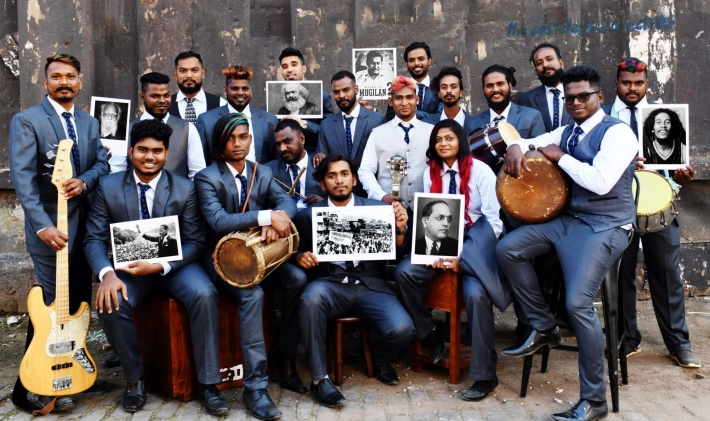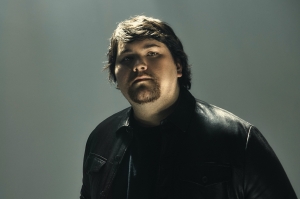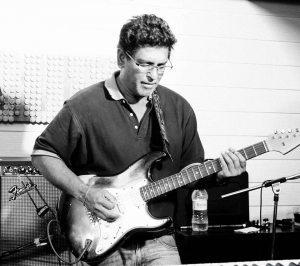
 Photo Courtesy: Madhavan Palanisamy
Photo Courtesy: Madhavan Palanisamy
The whole ‘music with a message’ movement has taken on an international bent of late with all that has been going on in the world. India is no different considering everything we have going on right now. Of course, we are a country with a rich and often dark history; there are things that have persisted across hundreds and even thousands of years that trouble our already troubled society today. Now making art about that is important too, and that is what Chennai-based The Casteless Collective concerns themselves with. They fuse ‘gaana’ (the funeral music of some communities in Tamil Nadu) and contemporary sounds to create something that considers getting through to your head its main purpose. It informs, it enlightens and it might anger some, but beyond that is important dialogue and that is where this music could and should go. We spoke to their bandleader Tenma about… well, a lot.
What was the selection process to find the musicians that eventually formed The Casteless Collective? You had put out offers for people to audition to be in the band and around 150 people replied initially, so what were you looking for in an artist for this band?
So I had a label when this whole thing started and shut it soon after. I also had another collective which was dealing with breaking stereotypes in the indie scene… this is my 17th year as an indie musician. Obviously it’s a very privileged environment; if you speak English it makes it a bit easier to move ahead at least in certain places and social circles. I grew up in a sort of ghetto situation in North Madras, but I had essentially two lives. One was the school and college route and the other was where I lived. I was attached to the latter because there was no way I could have measured up to the other side, like have Nikes or some such thing. Not many artists (except an Indian Ocean or the like) connected with me, so when Pa.Ranjith (the director of a whole host of acclaimed Tamil movies that deal with subjects of caste and creed) called me to start this and work with gaana artists, they were the same kind of musicians I grew up around. My area was filled with jazz musicians and gaana. He also proposed using things like the satti and the kattamolam (which are funeral instruments). As a producer, it was pretty interesting. So Ranjith put out a call. The first few days were more to check out the people’s personalities and so on… to see whether they were there for the music or for Ranjith, because he is an iconic personality. It took time. Many people thought they were singing for his movie, so when they realised it wasn’t that, they left.
Gaana has groups and ‘gangs’ (not gangsters, but cultural communities) that differ similar to how hip-hop does abroad; there are ideological differences and so on. So I got different musicians from these different communities but I did not tell them they were selected. These were not academically trained musicians either, these were people who were making music for survival. I had a successful band called Kurangan and even then I had become aware that things like language and so on presented problems in the indie scene at points, so I wanted to do something that rebelled against all that. So I got a group together; only one person was a known musician that sang in films. Everyone else was an unknown face. I told some of the popular gaana singers that I didn’t want them because I wanted a fresh start. It’s not easy to ask people who have been in a system to unlearn things and all that, and I wanted people with fire, who wanted to achieve greatness. So I got all these players in and initially liked two of them. I had never heard percussions and rhythms like that before, and to bring in a contemporary feel I brought some open-minded and non-judgemental indie musicians in. In the process of making a band or system that to this day doesn’t function like an indie band (it’s more of a bandleader situation bringing music to the group, much like how Frank Zappa used to function), we start jamming and things start coming together. When I got them in, I sort of framed them based on different musical superstars. For example, Muthu (gaana Muthu) is modelled after Freddie Mercury. He doesn’t speak a word of English but he’s seen every Queen video. Sometimes people even call him Freddie because he embodies that style, but from a completely different world. One was after Zack de la Rocha, one after James Brown (his performance is based a lot on footwork and that kind of dancing, so James Brown was my reference)… Isaivani is originally from a light music background. She came in on the third or fourth day and I was anyway looking to get female musicians in because indie bands are often completely male of course. No one was coming forward, but she did. In fact, when she auditioned, she was looking at the door and singing to me; it seemed like there was something outside that was coming in the way of her performance. It was still a great performance, so I had to have her. We tried everything at first; her parents weren’t on board and so on, but after she sang at the first gig, her parents got it. Gaana itself is pretty much male-dominated, so this was important. All in all, it was a long process and really heavy… I’ve never done anything close to it in my life.
There’s a relationship between gaana and death, and the first idea people have is that it’s closely related with it (and it is). But that fact, especially in some urban or closed cultural groups, brings a stigma along with it because people don’t want to hear music that is so married with deeath. But there is music connected with death all over the world and at times, it is even appreciated that such music is made and written… it’s even seen as beautiful. Where do you think the block is here where some people turn up their noses at such a concept?
There are two ways to look at this. One is the existing structure we belong to, caste and privilege. Death is looked at something that impure and so do people who play about it. Even associations like when you go to a graveyard, you’re asked to wash your hands and legs… there are preconceived notions and a caste label is put on these musicians and people. Gaana is basically songs that are brought together by travellers to send deceased slaves on, that at least in death you will find liberation. In fact, only in death can they find it. What is considered pure is divine and holy… like creation. This is the opposite. Even when metal and other genres that deal with it, there is possibly a systemic thought about funerals and death itself being impure (not always, of course).
Secondly, psychologically there are subtle casteist movements, so to speak, that make us resist even understanding death. Death can be anything, a stopgap or an end; either way it’s a moment. It’s not glorifying it either. The Indian music scene doesn’t seem to be very conscious about it… they’re conscious about the African-American structures for example (on the surface)… like they wouldn’t use the N-word, but they’d easily use a caste term. There’s no blame obviously. There’s just a lack of consciousness about it. You can take the music but you have to understand the feeling behind it. Otherwise it isn’t genuine.
Casteless Collective is a pretty big live operation with so many members. How have you been managing in the virtual gig situation in the pandemic? It must be a bit difficult to give your best performance without the energy of a crowd… how have you managed to retain the showmanship of the members when there’s a screen between us and the band.
Actually, even when there’s a crowd of 10000 people in front of us, we have our own party. We truly enjoy playing with each other. Even at shoots… we recently did a shoot for AR Rahman’s festival he’s doing (as part of his new venture Maaja), we really enjoyed ourselves. In the beginning, the first five minutes, it had been a while since we performed together. But once the beat kicked in, we didn’t care who was in front of us. It was almost like we were competing with each other. We used to have these competitions within the band; at every show, the weakest performer would have to treat us that night. That kept our spirits going... we don’t do that anymore, but we just have fun. It doesn’t matter how many people are in front of us, the message and the medium have to be strong.
Even our afterparties and stuff are just always filled with so much music and dancing. The show goes on, it doesn’t stop. Gaana singers normally perform for eight hours, right? For them, half an hour or an hour is a piece of cake. It’s all about enjoyment. Nothing else really matters.
There’s a lot of press about the band and its message, of course, but there is a curious lack of it here. There are articles in papers and all that, but it seems like ‘foreign outlets’ are a bit more forward with featuring what Casteless Collective is doing and its context (considering places like Vice and BBC have been giving it detailed press and public space). Do you have any thoughts on why this odd discrepancy could be?
Remember the Rihanna thing? I went with Bann (RSJ’s editor-director) to the Great Escape in Brighton, and when we spoke to some people there, they were all saying the caste system should be illegal… But of course, it isn’t and all the information isn’t out there. It’s a matter of representation. We’ve always sent out people who put up this image of how we’re a perfect country and all that. It’s simple; how often have we had a conversation about Ambedkar itself outside the country? Even in textbooks and all that, there are gaps. People got comfortable in their privilege, so they don’t really want to say much. Even when these things come forward, they feel reluctant to talk about it… they feel ashamed in a way. It isn’t fear. They want to write and talk about these things, but when they write about us, they don’t want to write about the consequences of what we’re talking about.
Yes, they write about Casteless Collective and all that, but… there’s honour killing everywhere for example. But they have that feeling of ‘Oh shit, we’re such shitty people’… lynching is a common thing among every community; it’s not just some parties that do it. And casteism isn’t just a thing in the upper class, it happens at all levels. It’s similar to the pro-black movement in hip-hop in the 90s where they made it seem like a pro-crime movement. Here, it’s just that they don’t want to accept it, like caste doesn’t exist. I don’t see caste or discriminate, so for me it doesn’t. It’s also not based on colour. There’s a dark Brahmin and a fair Dalit. So it’s not visual, it’s psychological, and this is what people haven’t been able to explain in detail. Occasionally you’ll get a brutal piece in the press. And again, I’m not blaming journalists or anything. They do want to talk about it, they do, but the system and the hierarchy their work has doesn’t let them. In that case, it’s easier to write close to the truth instead of itself. People like BBC and Vice and all these people are trying to understand how our oppression is like theirs, and what the consequences are.
Discussions are important, sure, but the way our protests have worked is that the discussions stop very early on. If I don’t agree with your opinion or vice versa, it’s hate. It doesn’t even go towards compromise or anything. A lot of people told me not to do this. I’m an indie guy to begin with; when I met Ranjith who encouraged doing this on a large scale, people just said not to do it. The system is messed up; when a dalit talks about caste, they are called casteist but when a African-American talks about race, would you call them racist? Then you have people on the other side who’d say ‘remove reservation’, but that’s not this; it doesn’t make two thousand years of history disappear. It’s about understanding… if you are informed about the American narrative, put that situation here and figure out who you are for example. A lot of people find it hard because they aren’t sure who they are in all this.
What does Casteless Collective have coming up?
We’re working on a second album that has seven songs right now. We’re also going to put out content from other independent artists on our channel and host shows… They’ll have a more inclusive environment for indie artists and folk artists to play together. We’re also going to continue doing our live shows.
Previous Article The Busking Man Speaks On His New Album And Offbeat Musical Journey The Busking Man Speaks On His New Album And Offbeat Musical Journey
|
Next Article Muzak, Elevators and Brainwashing Muzak, Elevators and Brainwashing
|
Debojyoti Nath left his life behind to do a two-year journey busking in every state in the country. Then he decided to put out an album. That’s a lot.
The bassist talks about his father Eddie, future music and musical journey
We speak at length about guitar, music and the indie scene of old with one of the country’s most renowned players and session musicians






Leave a comment